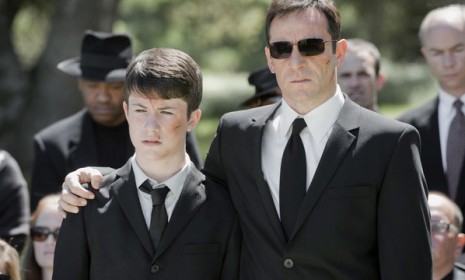Is Awake too confusing to be a hit?
NBC's new drama is earning some of the year's strongest reviews. But not all viewers will have the patience to deal with its complex, multiple-realities plot

A free daily email with the biggest news stories of the day – and the best features from TheWeek.com
You are now subscribed
Your newsletter sign-up was successful
Critics are praising Awake, NBC's maniacally-promoted new drama for its ambitious premise and makes-you-think plot. But does the show, which premieres Thursday, make you think too strenuously? Awake centers on an LA cop named Michael (played by Jason Isaacs), who survives a car accident in which either his wife or his teenage son has died. When he recovers consciousness after the accident, he appears to live in two different realities. One day, he wakes up to find his wife alive and his son dead. But the next morning, the situation is reversed. The two realities alternate from day to day, and neither Michael nor the audience can tell which is real and which is a dream. (Watch a preview below.) Are strong reviews enough to hook audiences, or will Awake crumble under the weight of its own complexity?
It's intriguing enough to find an audience: Awake may be the "most complicated narrative since ABC's Lost," says Tim Molloy at The Wrap. But it's still "the best new show of the season." Viewers, captivated by the question of which world is real, will find both so compelling that they "won't want to lose either one." Too bad the show grows ponderous when it abandons the who's-alive-and-what's-real mystery so Michael can solve each episode's police case. But overall, Awake "lives up to the promise of [its] ambitious concept."
"Awake is the best new show of the season"
The Week
Escape your echo chamber. Get the facts behind the news, plus analysis from multiple perspectives.

Sign up for The Week's Free Newsletters
From our morning news briefing to a weekly Good News Newsletter, get the best of The Week delivered directly to your inbox.
From our morning news briefing to a weekly Good News Newsletter, get the best of The Week delivered directly to your inbox.
But can it keep that audience? In 2012, people are attracted to TV they can watch while multitasking, says Linda Holmes at NPR. Someone can return to an episode of Jersey Shore after leaving to do the dishes and check Facebook without missing a thing. And in standard crime procedurals, the lead characters tend to recap and explain "what everything means the moment it happens." Awake is far less helpful. Though anyone "who wants television to be more thoughtful and imaginative" should check it out, be prepared to watch it as if it were a movie requiring full attention.
"Awake, multitasking, and what it means to be complicated"
The show is too confusing for its own good: Awake's pilot introduces an undeniably intriguing premise, says Robert Bianco at USA Today. But the three episodes that follow needlessly pile more complications on top of it. A baffling conspiracy surfaces, new characters muddy everything up, and it becomes increasingly difficult to keep track of the two worlds or remember why you liked the show in the first place. "No one wants to return to the color-by-number plotting of Diagnosis: Murder," but that doesn't excuse Awake for "demanding too much effort from an audience without sufficient reward."
"It's too bad Awake doesn't rest easily"
A free daily email with the biggest news stories of the day – and the best features from TheWeek.com
-
 Buddhist monks’ US walk for peace
Buddhist monks’ US walk for peaceUnder the Radar Crowds have turned out on the roads from California to Washington and ‘millions are finding hope in their journey’
-
 American universities are losing ground to their foreign counterparts
American universities are losing ground to their foreign counterpartsThe Explainer While Harvard is still near the top, other colleges have slipped
-
 How to navigate dating apps to find ‘the one’
How to navigate dating apps to find ‘the one’The Week Recommends Put an end to endless swiping and make real romantic connections